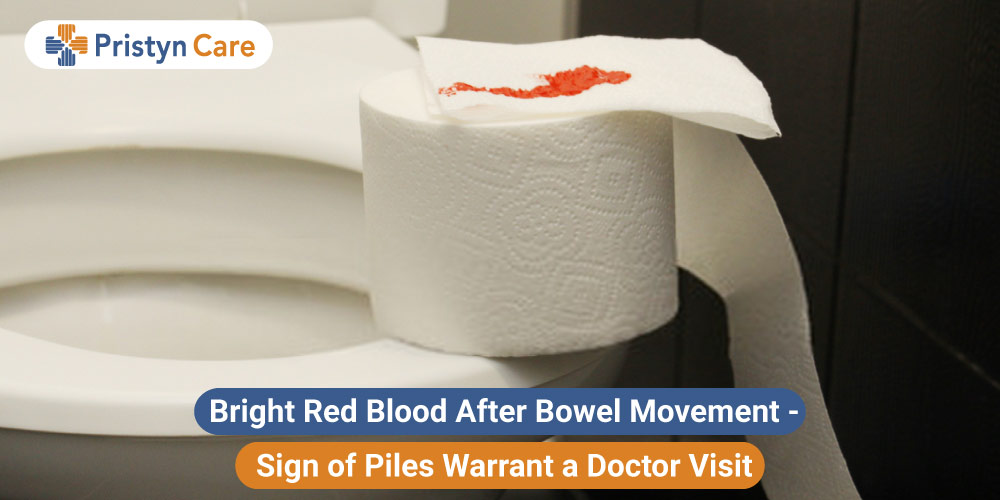
It is frightening to see blood in stool for anyone. This can sometimes be bright red blood after bowel movement after a bowel movement can be a false alarm whereas it can also denote a health problem. Although rectal bleeding is common, very few of those affected seek treatment. Rectal bleeding can be caused by:
- Hemorrhoids or Piles
- Anal fissure
- Anal abscess or fistula
- Diverticulosis/Diverticulitis
- Inflammatory bowel disease (IBD)
- Ulcers
- Polyps
- Colorectal Cancer
Not always necessary that you are able to notice rectal bleeding with the naked eyes. The color of the blood says where the problem might be.
- Bright red color: Bleeding in lower rectum or colon
- Maroon color: Bleeding in the upper part of the colon or small bowel
- Melena color (tar-like): Bleeding in the stomach
Also read: Things stool say about your health
Table of Contents
Things to do when you notice blood after bowel movement
If you notice anything unusual or you notice blood after bowel movement along with other symptoms such as pain, itching, inflammation, burning sensation or injury, consult a general physician. Check for following signs:
- Blood in stool or on toilet paper
- Color of the stool – bright red or dark red
- Amount of blood in the stool
- Straining during bowel movement
- Frequency of bowel movement
- Did you go for any surgery or colonoscopy recently?
- Any family history of similar problems
You need to mention all these symptoms to the doctor to figure out the underlying cause of the blood in stool. This might be hemorrhoids piles. So, get it diagnosed before piles get complicated.
Diagnosis or test for blood in stool
The doctor performs a physical examination to find out the cause of rectal bleeding. You need to mention all the symptoms that you notice as mentioned above. Depending on your condition the doctor may suggest following tests for investigating the cause:
- Fecal occult blood test (FOBT) or fecal immunochemical test (FIT): Checks for the presence of blood. (Also read: Stool test for hemorrhoids)
- Complete Blood count(CBC): This is to find out the amount of blood you have lost.
- Colonoscopy: An instrument, colonoscope, to look inside the colon. If there are polyps, they are removed at the same time from the lining of the colon. (Also read: Colonoscopy for Piles)
- Sigmoidoscopy – It allows the doctor to see only the final part of the colon, including the sigmoid colon and the rectum.
- Clotting time: There are people who take medicines that include blood thinners. The doctor may check for blood consistency.
Also read:
Hemorrhoids need Treatment When You See Blood in Stool
Signs and symptoms of hemorrhoids usually depend on the type of hemorrhoid.
External hemorrhoids
These are under the skin around your anus. Signs and symptoms might include:
- Itching or irritation in your anal region
- Pain or discomfort
- Swelling around your anus
- Bleeding
Also read: Fastest Ways To Get Rid of External Hemorrhoids
Internal hemorrhoids
Internal hemorrhoids lie inside the rectum. You usually can’t see or feel them, and they rarely cause discomfort. But straining or irritation when passing stool can cause:
- Bleeding during bowel movements. You might notice small amounts of bright red blood in stool or on the toilet paper.
- Hemorrhoids pop out through the anal opening (prolapsed or protruding hemorrhoid), resulting in pain and irritation.
Thrombosed hemorrhoids
If blood pools in external hemorrhoid and forms a clot (thrombus), it can result in:
- Severe pain
- Swelling
- Inflammation
- A hard lump near your anus
When to see a doctor
If you have bleeding during bowel movements or your hemorrhoids do not improve even after medication then consult your doctor. Assuming that rectal bleeding is due to piles may be wrong, especially if you have notice changes in bowel habits or if your stools change color or consistency. Blood in stool can occur with other diseases, including colorectal cancer and anal cancer. Seek medical care or visit a nearby doctor if you have bright red blood after bowel movement, lightheadedness, dizziness, or faintness.
Also read: Is Hemorrhoids Painful? – FAQs
Also read: Ice packs for piles















